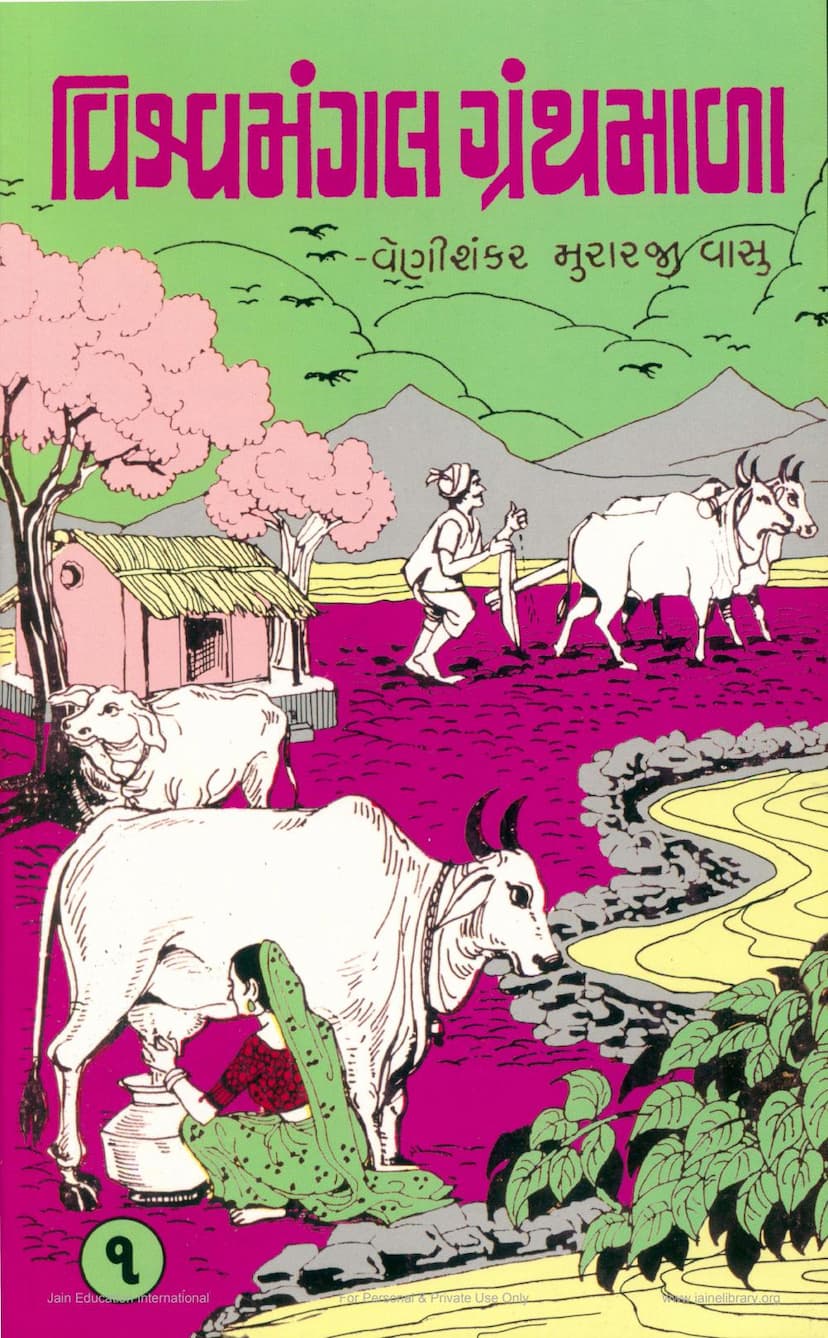Vishvamangal Granthmala Part 01
Added to library: September 2, 2025

Summary
Here's a comprehensive summary of the provided Jain text, "Vishvamangal Granthmala Part 01" by Veishankar Murarji Vasu, based on the content of the pages you've shared:
The book, "Vishvamangal Granthmala Part 01," authored by Veishankar Murarji Vasu and published by Kamal Prakashan Trust, is a critical examination of India's cultural and economic decline, attributing it largely to the influence of Western ideologies and policies, particularly those implemented during British rule and continued after India's independence. The central argument revolves around the devastating impact of the erosion of traditional Indian values, especially those connected to the reverence and protection of cows and the agrarian economy, which the author believes are intrinsically linked to the nation's spiritual and material well-being.
The book highlights Lord Macaulay's educational system as a deliberate attempt to create a class of "Indian Englishmen" who would serve foreign interests by undermining Indian culture and traditions. The author contends that this Western-influenced education has produced a generation of "educated" individuals who, knowingly or unknowingly, have attacked the very roots of Indian culture.
Key Themes and Arguments:
- Cultural Annihilation by Western Influence: The primary thesis is that Western systems, especially the educational model introduced by the British, have systematically dismantled India's rich cultural heritage. This includes the promotion of Western values, economic policies, and a disregard for indigenous practices.
- The Centrality of the Cow (Go-vansh): The author places immense importance on the cow and its role in the Indian ecosystem and economy. The destruction of cattle wealth through policies and practices like slaughter is seen as a direct attack on India's sustenance, agriculture, environment, and spiritual foundation. The book details how the decline of cattle has led to a shortage of milk, ghee, fuel, manure, and efficient draft animals for agriculture.
- Critique of Modern Economic Policies: The book is highly critical of mixed economies and Western-style industrialization, particularly the dairy industry's focus on commercialization over traditional animal husbandry. It argues that these policies prioritize profit over sustainability and well-being, leading to the import of milk powder and butter oil, while decimating local resources.
- Destruction of Traditional Livelihoods: The author details how traditional occupations, such as those of the Harijans (leatherworkers) and Kshatriyas, were systematically destroyed by the decline of cattle wealth and the shift away from traditional practices. This led to unemployment, poverty, and social disruption.
- The Subversion of Education and Leadership: Macaulay's education system is blamed for creating an intellectual class disconnected from Indian realities, devaluing traditional knowledge, and promoting Western ideals that are detrimental to the nation. The author criticizes the current leadership for perpetuating these flawed systems and failing to address the root causes of India's problems.
- The Role of Foreign Interference and Conspiracy: The book suggests that many of India's current crises, including food shortages, economic instability, and the decline of cultural values, are the result of a deliberate, well-orchestrated conspiracy by Western powers and their Indian agents.
- Critique of Family Planning Policies: The author questions the rationale and methods of family planning programs, suggesting they are misguided and potentially harmful, leading to social unrest and moral decay rather than genuine societal improvement.
- The Importance of Indigenous Systems: The book champions the revival of traditional Indian practices, such as decentralized village economies, the use of bullock carts, indigenous farming methods, and the reverence for natural resources like forests, water, and cattle. It argues that these systems, when properly understood and implemented, are more sustainable and beneficial than Western models.
- Call for a Return to Traditional Values: The author's underlying message is a fervent plea for a return to the core spiritual and ethical principles of Indian civilization. The book argues that true prosperity and peace can only be achieved by re-establishing the reverence for nature, the protection of all life (Go-raksha, Van-raksha, Bhu-raksha, Jal-raksha), and a life guided by Dharma and cultural integrity.
Structure and Content:
The book is structured into chapters addressing various interconnected issues, including the destruction of culture, cow protection, the link between animal destruction and human ruin, the curse of meat-eating in Western culture, looming threats to India, the importance of cow dung, housing, transportation, oil, the destruction caused by a mixed economy, unrealistic food policies, prohibition, and the dangers of family planning. The author uses historical examples, statistics, and strong rhetorical appeals to underscore his arguments.
In essence, "Vishvamangal Granthmala Part 01" is a passionate and critical work advocating for a radical shift back to India's traditional roots, with a particular emphasis on the critical role of the cow and a holistic, nature-aligned economy. It serves as a warning against the continuation of Western-influenced policies that the author believes are leading India toward a grave crisis.